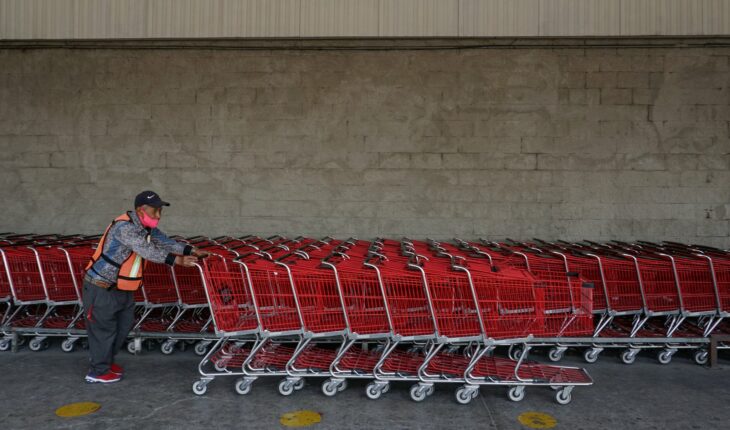Before the pandemic, Juan Felipe Aguilar made a living shining shoes in the zócalo of Chilpancingo de los Bravo, in an informal shopping plaza. But in April 2020, the municipal government of Chilpancingo, the capital of the state of Guerrero, announced restrictions to curb the spread of the coronavirus, so the 64-year-old had to close his shoe shining stand and run out of income.
Although because of his age and diabetes, he was more vulnerable to COVID-19, the disease caused by the coronavirus, Aguilar could not afford to stop working.
He says finding work was tricky, as most companies preferred to hire younger people. He started selling firewood. For about six months, Aguilar would leave his house every morning carrying firewood on his shoulders. All day, he walked the streets of Petaquillas, the town where he lives, 9 kilometers from Chilpancingo, looking for customers.
“If I don’t go out, who’s going to feed me?” says Aguilar.
Read more | Women turn to sex work to tackle the COVID economic crisis
Their problems are an example of the economic hardships of many people over 60, an age group that makes up about 12% of the Mexican population, who say they receive meagre pensions and have few job opportunities and little government infrastructure to support them. Many work in the informal sector, which has been particularly affected by coronavirus prevention measures.
In Mexico, about 41% of people over the age of 65 live in poverty, according to the National Council for the Evaluation of Social Development Policy (CONEVAL), a decentralized public body that measures poverty and evaluates the country’s social programs.
As most worked in the informal sector before retiring, only 28% have a retirement pension, according to a study by Berenice Ramírez, a senior researcher at the Institute of Economic Research at the National Autonomous University of Mexico.
Jesus Miguel Martinez, 64, who works as a “comes comes” in a store and earns money through tips, says the pandemic has changed the consumption habits of customers, and now has less income.
Martinez helps customers find parking and get their groceries to their cars. But because of the pandemic, he explains, fewer people go to the store. The few that do, prefer to keep their distance from the “coming comes”.
There is little government support to help older adults meet their needs, Aguilar says. “The government said they were going to give us food supply, but they didn’t give us anything,” he says.
Mara Vicencio, at the time of the interview, general director of the Guerrerense Institute for the Comprehensive Care of the Elderly, a semi-autonomous government agency, says that although the Government has not given special support so that older adults suffer less from the ravages of the pandemic, it has continued to provide the services they already had.
Those over 68 can apply for the Universal Pension for Older Adults, an official welfare program nationwide, explains Vicencio. Every two months, those who signed up receive 3,100 pesos (approximately $152). People over the age of 60 can also apply for a card issued by the National Institute of Older Adults (INAPAM), which offers discounts on various goods and services.
In a press release in August, the institute said it supports seniors by offering legal advice, medical services and job placement so they can find work in supermarkets like cerillos (who pack groceries) and earn money through tips. But the program has gone through many difficulties since the pandemic began, including an interruption to stop the spread of the coronavirus, which left many seniors out of work.
Aguilar, who like Martinez does not meet the requirements for the federal government’s pension and could not apply for the INAPAM card due to restrictions to stop the spread of the coronavirus, feels forgotten.
Francisco Alarcón Muñoz, a recipient of the government pension, agrees. He says the support he receives is barely enough to cover his expenses. At 77, he, like Martinez, must continue to work as he comes in a store, the only job he could find when the pandemic began.
“I came to work as it comes because I no longer had anything to eat,” says the slender gray-haired man, who separated from his family 40 years ago and lives in the world.olo. He earns between 100 and 200 pesos a day (between $5 and $10) and worries about not having savings for when he can no longer work. For now, you’re saving as little as you can in case you get sick.
Local and federal officials did not respond to requests for comment about whether more support has been offered to seniors who do not qualify for the federal government’s pension, or to allegations that the government pledged to support them during the pandemic.
Meanwhile, Aguilar reopened his shoe shine stand when the government lifted restrictions in May, but says he has fewer customers and therefore earns less. Before the pandemic, he earned more than 250 pesos (about $12); now he only earns 150 pesos (about $7) per day.
He worries about possible future restrictions. He would have to sell firewood again.
This story was originally published by Global Press Journal.
What we do at Animal Político requires professional journalists, teamwork, dialogue with readers and something very important: independence. You can help us keep going. Be part of the team.
Subscribe to Animal Político, receive benefits and support free journalism.#YoSoyAnimal





